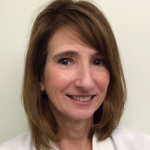“Perhaps this is due to the rarity of pediatric rheumatic disease and the complexity of many cases,” Dr. Stoll says.
Advantages Abound
Rheumatologists who work in hospital settings have reaped many rewards. For Dr. Fernandez, having a large administrative support structure means that others take care of many of the headaches that come with managing a private practice, such as selecting and paying for malpractice insurance, maintaining active participation status in private insurance networks, ensuring regulatory compliance and maintaining a social media presence and website.

Dr. Fernandez
Further, Dr. Fernandez has access to a plethora of specialists at HSS and its affiliates, which makes it easier to care for patients. “The size of the practices means that patients can generally be seen in a timely fashion,” he says. The electronic medical record systems can communicate with each another, making it easier to follow up on the outcomes of consultations or view laboratory or imaging studies. By being in a large group, coverage on weekends and consult service is less frequent and demanding. Access to other resources such as in-person translators and social workers has proved valuable.
Abby Abelson, MD, chair, Department of Rheumatic and Immunologic Diseases, Cleveland Clinic, Cleveland, Ohio, has also found that having administrative support and infrastructure enables rheumatologists to focus on what they were trained to do—clinical care, research and education—so they can reach their full potential.
Dr. Abelson also appreciates the opportunity to collaborate with others throughout the institution without silos or financial barriers. “Many of my colleagues have introduced me to physicians from other specialties to help manage our complex patients with multi-system diseases; I have done the same for other staff as they joined us,” she says.

Dr. Hughes
In addition, rheumatologists are supported in their quest for leadership positions. “I have been able to take many leadership courses and served on our Board of Governors and our Physician Leadership Council, where decisions are made about institutional strategy and policy,” she says.
“These skills have enabled me to contribute to other organizations, including the ACR and Rheumatology Research Foundation,” says Dr. Abelson.
Dr. Stoll has found that having instant access to other hospital specialists for informal or formal consultations is a significant advantage. “If a patient gets an X-ray, I can easily ask a surgeon in real time for a diagnosis, rather than refer the patient to orthopedics and wait for an answer,” he says.
Some Drawbacks

Dr. Stoll



